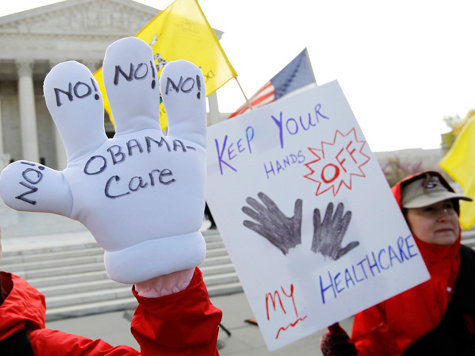
Just when most people thought all legal challenges to the Individual Mandate were dead and buried, one springs back to life, and with a twist.
Unless they’ve been living under a rock, most Americans have heard that the Supreme Court decided a constitutional challenge to Obamacare’s infamous Individual Mandate in NFIB v. Sebelius. Plenty of Americans are unaware, however, that out of over 30 cases challenging the Mandate, NFIB was only one of five challenges that were considered serious and credible.
Another one of those major cases was Liberty University v. Geithner, argued by the university’s law school dean Mat Staver, who is also chairman of Liberty Counsel, a public-interest law firm. When the Supreme Court decided NFIB, it denied petitions for review of all the other cases.
Staver filed a petition for rehearing, asking the Court to reconsider because Liberty University was different in several regards from the other cases. Now the U.S. Department of Justice (DOJ) has agreed, saying it does not object to the case being resuscitated.
In addition to making the same arguments about the constitutionality of the Individual Mandate in regards to the Commerce Clause and Congress’ taxing powers, Liberty argues that the mandate violates other constitutional prohibitions. The university contends that Obamacare violates its First Amendment religious freedoms through its funding of abortions and other practices that are contradictory to the religious mission of the university.
The lawsuit also challenges one of the other major provisions of Obamacare–the Employer Mandate. This article of the law requires that all companies employing 50 or more people must provide health insurance that meets federal guidelines, or the employer will be subject to a penalty of $2,000 per employee, per year (a minimum penalty of $100,000 a year for companies that meet the 50 employee provision).
A three-judge panel of the U.S. Court of Appeals for the Fourth Circuit had previously held that these mandates were taxes, and that a federal law called the Anti-Injunction Act (AIA) did not permit any federal court to consider the legality of these taxes/mandates until after they go into effect in 2014. The Fourth Circuit dismissed Liberty University for lack of jurisdiction without even considering the merits of the legal claims.
When the Supreme Court took on NFIB, it examined the AIA issue before addressing the merits of the case and unanimously held that the AIA did not deprive federal courts of power to decide such cases. This contradicted the Fourth Circuit’s reasoning for not taking up the religious liberty and Employer Mandate issues presented by Liberty University.
It’s not surprising that Staver would petition for rehearing under such circumstances, but many were mildly surprised when the Supreme Court ordered DOJ to file a response to the motion as petitions for rehearing are very rarely granted. Even more surprising is the fact that DOJ is now telling the Court that they have no objection to rehearing.
This action could mean that DOJ is so confident they will prevail in subsequent proceedings that the administration welcomes any additional court action. While the Taxing Clause argument that Chief Justice John Roberts invoked to save the Individual Mandate in NFIB is much weaker when applied to the Employer Mandate, the Commerce Clause argument that was always the focus of DOJ’s strategy serves as a much stronger defense for the Employer Mandate.
Making these arguments will be an uphill battle for Liberty University’s lawyers, but this case nonetheless becomes the sole survivor of the first round of court battles over Obamacare. Staver presents plausible arguments against both the Individual Mandate and the Employer Mandate, and they deserve their day in court.
If the petition is granted, the Supreme Court will grant a writ of certiorari to claim the case, vacate (i.e., erase) the judgment of the Fourth Circuit, and then remand the case back down to the Fourth Circuit with instructions to consider arguments on Liberty University’s remaining constitutional claims.
The nation’s focus has rightly shifted to the second and third rounds of battling Obamacare through legislative repeal and challenging specific provisions of the law (such as the HHS Mandate’s violation of the Roman Catholic Church’s 1st Amendment rights), but there are still fighters on the battlefield from the first round of legal challenges. Convincing five justices to vote in favor of rehearing will be a greater test than getting into their courtroom the first time was, but now that DOJ has said it welcomes the fight, there is precious little reason for the Supreme Court not to give both sides what they’re asking for and send this case back to the lower court. If it does, many more Americans will soon learn the case name of Liberty University v. Geithner.
Author’s Disclosure: Breitbart News legal contributor Ken Klukowski is also on faculty at Liberty University School of Law, and filed briefs in NFIB v. Sebelius on behalf of the Family Research Council and Members of the United States Congress.

COMMENTS
Please let us know if you're having issues with commenting.